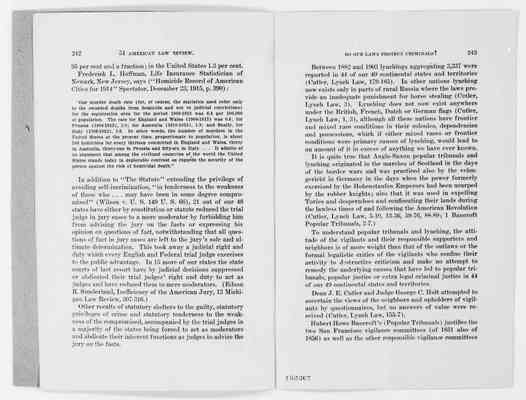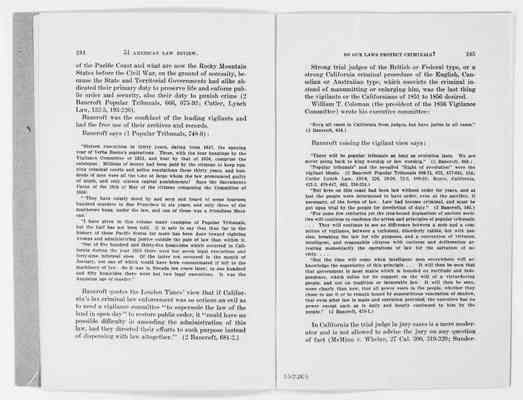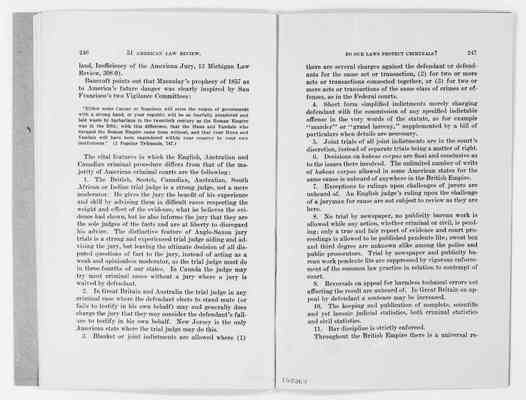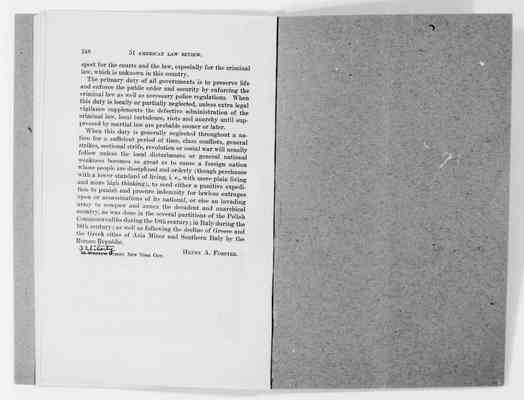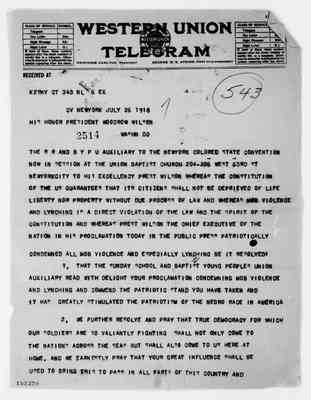Pages
242 51 AMERICAN LAW REVIEW
95 per cent and a fraction; in the United States 1.3 per cent. Frederick L. Hoffman, Life Insurance Statistician of Newark, New Jersey, says ("Homicide Record of American Cities for 1914" Spectator, December 23, 1915, p. 390):
"Our murder death rate (for, of course, the statistics used refer only to the recorded deaths from homicide and not to judicial convictions) for the registration area for the period 1909-1913 was 6.4 per 100,000 of population. The rate for England and Wales (1904-1913) was 0.8; for Prussia (1904-1913), 2.0; for Australia (1810-1913), 1.9; and finally, for Italy (1908-1912), 3.6. In other words, the number of murders in the United States at the present time, proportionate to population, is about 100 homicides for every thirteen committed in England and Wales, thirty in Australia, thirty-one in Prussia and fifty-six in Italy. . . . It admits of no argument that among the civilized countries of the world the United States stands today in deplorable contrast as regards the security of the person against the risk of homicidal death."
In addition to the "The Statute" extending the privilege of avoiding self-incrimination, "in tenderness to the weakness of those who . . . . may have been in some degree compromised" (Wilson v. U. S. 149 U. S. 66), 21 out of our 48 states have either by constitution or statute reduced the trial judge in jury cases to a mere moderator by forbidding him from advising the jury on the facts or expressing his opinion on questions of fact, notwithstanding that all questions of fact in jury cases are left to the jury's sole and ultimate determination. This took away a judicial right and duty which every English and Federal trial judge exercises to the public advantage. In 15 more of our states the state courts of last resort have by judicial decisions suppressed or abdicated their trial judges' right and duty to act as judges and have reduced them to mere moderators. (Edson R. Sunderland, Inefficiency of the American Jury, 13 Michigan Law Review, 307-316.)
Other results of statutory shelters to the guilty, statutory privileges of crime and statutory tenderness to the weakness of the compromised, accompanied by the trial judges in a majority of the states being forced to act as moderators and abdicate their inherent functions as judges to advise the jury on the facts.
DO OUR LAWS PROTECT CRIMINALS? 243
Between 1882 and 1903 lynchings aggregating 3,337 were reported in 44 of our 49 continental states and territories (Cutler, Lynch Law, 179-185). In other nations lynching now exists only in parts of rural Russia where the laws provide an inadequate punishment for horse stealing (Cutler, Lynch Law, 3). Lynching does not now exist anywhere under the British, French, Dutch or German flags (Cutler Lynch Law, 1, 3), although all these nations have frontier and mixed race conditions in their colonies, dependencies and possessions, which if either mixed races or frontier conditions were primary causes of lynching, would lead to an amount of it in excess of anything we have ever known.
It is quite true that Anglo-Saxon popular tribunals and lynching originated in the marches of Scotland in the days of the border wars and was practiced also by the vehmgericht in Germany in the days when the power formerly exercised by the Hohenstaunfen Emperors had been usurped by the robber knights; also that it was used in expelling Tories and desperadoes and confiscating their lands during the lawless times of and following the American Revolution (Cutler, Lynch Law, 5-10, 13-36, 59-76, 88-89; 1 Bancroft Popular Tribunals, 2-7.)
To understand popular tribunals and lynching, the attitude of the vigilants and their responsible supporters and neighbors is of more weight than that of the outlaws or the formal legalistic critics of the vigilants who confine their activity to destructive criticism and make no attempt to remedy the underlying causes that have led to popular tribunals, popular justice or extra legal criminal justice in 44 of our 49 continental states and territories
R. Sunderland, Inefficiency of the American Jury, 13 Michi gan Law Review, 307-316.) Other results of statutory shelters to the guilty, statutory
Dean J. E. Cutler and Judge George C. Holt attempted to ascertain the views of the neighbors and upholders of vigilants by questionnaires, but no answers of value were received (Cutler, Lynch Law, 155-7)
Hubert Howe Bancroft's (Popular Tribunals) justifies the two San Francisco vigilance committees (of 1851 also of 1856) as well as the other responsible vigilance committees
152367
244 51 AMERICAN LAW REVIEW.
of the Pacific Coast and what are now the Rocky Mountain States before the Civil War, on the ground of necessity, because the State and Territorial Governments had alike abdicated their primary duty to preserve life and enforce public order and security, also their duty to punish crime (2 Bancroft Popular Tribunals, 666, 675-93; Cutler, Lynch Law, 132-5, 193-226).
Bancroft was the confidant of the leading vigilants and had the free use of their archives and records.
Bancroft says (1 Popular Tribunals, 748-9):
"Sixteen executions in thirty years, dating from 1847, the opening year of Yerba Buena's aspirations. These, with the four hangings by the Vigilance Committee of 1851, and four by that of 1856, comprise the catalogue. Millions of money had been paid by the citizens to keep running criminal courts and police regulations these thirty years, and hundreds of men were all the time at large whom the law pronounced guilty of death, and only sixteen capital punishments! Says the Sacramento Union of the 28th of May of the citizens composing the Committee of 1856:
" 'They have calmly stood by and seen and heard of some fourteen hundred murders in San Francisco in six years, and only three of the murderers hung, under the law, and one of those was a friendless Mexican.'
I have given in this volume many examples of Popular Tribunals, but the half has not been told. It is safe to say that thus far in the history of these Pacific States far more has been done toward righting wrongs and administering justice outside the pale of law than within it.
"Out of five hundred and thirty-five homicides which occurred in California during the year 1855 there were but seven legal executions and forty-nine informal ones. Of the latter ten occurred in the month of January, not one of which would have been consummated if left to the machinery of law. So it was in Nevada ten years later; to one hundred and fifty homicides there were but two legal executions. It was the Augustan age of murder."
Baneroft quotes the London Times' view that if California's lax criminal law enforcement was so serious an evil as to need a vigilance committee "to supersede the law of the land in open day" to restore public order, it "could have no possible difficulty in amending the administration of this law, had they directed their efforts to such purpose instead of dispensing with law altogether." (2 Bancroft, 681-2.)
DO OUR LAWS PROTECT CRIMINALS? 245
Strong trial judges of the British or Federal type, or a strong California criminal procedure of the English, Canadian or Australian type, which convicts the criminal instead of manumitting or enlarging him, was the last thing the vigilants or the Californians of 1851 to 1856 desired.
William T. Coleman (the president of the 1856 Vigilance Committee) wrote his executive committee:
"Keep all cases in California from judges, but have juries in all cases." (2 Bancroft, 616.)
Bancroft voicing the vigilant view says:
"There will be popular tribunals as long as evolution lasts. We are never going back to King worship or law worship." (2 Bancroft, 668.)
"Popular tribunals" and the so-called "Right of revolution" were the vigilant ideals. (2 Bancroft Popular Tribunals 668-71, 675, 677-681, 154; Cutler Lynch Law, 1938, 226, 29-30, 72-3, 109-10; Royce, Callfornia, 421-2, 439-447, 465, 316-324.)
"But here on this coast had been law without order for years, and at last the people were determined to have order, even at the sacrifice, if necessary, of the forms of law. Law had become criminal, and must be put upon trial by the people for dereliction of duty." (2 Bancroft, 145.)
"For some few centuries yet the iron-bound dogmatism of ancient societles will continue to condemn the action and principles of popular tribunals. . . . They will continue to see no difference between a mob and a committee of vigilance, between a turbulent, disorderly rabble, hot with passion, breaking the law for vile purposes, and a convention of virtuous, intelligent, and responsible citizens with coolness and deliberation arresting momentarily the operations of law for the salvation of society. . . .
But the time will come when intelligent men everywhere will acknowledge the superiority of this principle. . . . It will then be seen that that government is most stable which is founded on rectitude and independence, which relies for its support on the will of a virtue-loving people, and not on tradition or inexorable law. It will then be seen, more clearly than now, that all power vests in the people, whether they chose to use it or to remain bound by superstitious veneration of shadow, that even after law is made and execution provided, the executive has no power except such as is daily and hourly continued to him by the people." (2 Bancroft, 670-1.)
In California the trial judge in jury cases is a mere moderator and is not allowed to advise the jury on any question of fact (McMinn v. Whelan, 27 Cal. 300, 319-320; Sunder-
[152368]
246
51 AMERICAN LAWW REVIEW.
land, Inefficiency of the American Jury, 13 Michigan Law Review, 308-9).
DOOUR LAWS PROTECT CRIMINALSI
247
there are several charges against the defendant or defend ants for the same act or transaction, (2) for two or more
Baneroft points out that Macaulay's prophecy of 1857 as
acts or transactions connected together, or (3) for two or
to America's future danger was clearly inspired by San
more acts or transactions of the same class of crimes or of-
Francisco's two Vigilance Committees:
fenses, as in the Federal courts.
Either some Caesar or Napoleon will seize the reigns of government with a strong hand, or your republic will be as fearfully plundered and
4. Short form simplified indictments merely charging defendant with the commission of any specified indictable
offense in the very words of the statute, as for example
laid waste by barbarians in the twentieth century as the Roman Empir
murder or "grand larceny,
was in the fifth; with this difference, that the Huns and Vandals wh ravaged the Roman Empire came from without, and that your Huns and
particulars when details are necessary.
Vandals will have been engendered within your country by your own institutions (2 Popular Tribunals, 747.)
supplemented by a bill of
5. Joint trials of all joint indictments are in the court's
discretion, instead of separate trials being a matter of right
The vital features in which the English, Australian and
6. Decisions on habeas corpus are final and conclusive as
Canadian criminal procedure differs from that of the ma jority of American criminal courts are the following:
to the issues there involved. The unlimited number of writs
1.
of habeas corpus allowed in some American states for the
The British, Scotch, Canadian, Australian, Soutt
same cause is unheard of anywhere in the British Empire.
African or Indian trial judge is a strong judge, not a mere
7. Exceptions to rulings upon challenges of jurors are
moderator. He gives the jury the benefit of his experience
unheard of. An English judge's ruling upon the challenge
of a juryman for cause are not subject to review as they are
and skill by advising them in difficult cases respecting the
here
weight and effect of the evidence, what he believes the evi-
dence had shown, but he also informs the jury that they are
8. No trial by newspaper, no publicity burean work is
the sole judges of the facts and are at liberty to disregard
allowed while any action, whether criminal or civil, is pend ing; only a true and fair report of evidence and court pro
his advice. The distinctive feature of Anglo-Saxon jury trials is a strong and experienced trial judge aiding and ad
ceedings is allowed to be published pendente lite; sweat box
vising the jury, but leaving the ultimate decision of all dis
and third degree are unknown alike among the police and
puted questions of fact to the jury, instead of acting as a
public prosecutors. Trial by newspaper and publicity bu rean work pendente lite are suppressed by vigorous enforce
weak and opinionless moderator, as the trial judge must de
in three fourths of our states. In Canada the judge may
ment of the common law practice in relation to contempt of
try most criminal cases without a jury where a jury is
court 9. Reversals on appeal for harmless technical errors not
waived by defendant.
affecting the result are unheard of. In Great Britain on ap
2. In Great Britain and Australia the trial judge in any
peal by defendant a sentence may be increased.
criminal case where the defendant elects to stand mute (or
fails to testify in his own behalf) may and generally does charge the jury that they may consider the defendant's fail
10. The keeping and publication of complete, scientific
and yet laconic judicial statisties, both criminal statisties and civil statisties
are to testify in his own behalf. New Jersey is the only American state where the trial judge may do this.
11. Bar discipline is strictly enforced
Throughout the British Empire there is a universal re-
3. Blanket or joint indictments are allowed where (1)
152369
248 51 AMERICAN LAW REVIEW.
spect for the courts and the law, especially for the criminal law, which is unknown in this country.
The primary duty of all governments is to preserve life and enforce the public order and security by enforcing the criminal law as well as necessary police regulations. When this duty is locally or partially neglected, unless extra legal vigilance supplements the defective administration of the criminal law, local turbulence, riots and anarchy until suppressed by martial law are probable sooner or later.
When this duty is generally neglected throughout a nation for a sufficient period of time, class conflicts, general strikes, sectional strife, revolution or social war will usually follow unless the local disturbances or general national weakness becomes so great as to cause a foreign nation whose people are disciplined and orderly (though perchance with a lower standard of living, i.e., with more plain living and more high thinking), to send either a punitive expedition to punish and procure indemnity for lawless outrages upon or assassinations of its national, or else an invading army to conquer and annex the decadent and anarchical country, as was done in the several partitions of the Polish Commonwealths during the 18th century; in Italy during the 16th century; as well as following the decline of Greece and the Greek cities of Asia Minor and Southern Italy by the Roman Republic.
HENRY A. FORSTER.
76 WILLIAM ^32 Liberty^ STREET, NEW YORK CITY.
aes or ernce
WESTERSS UNIONEE
1
8
O
TELBGRAN
Tes Ena
18
2 22
NEWCOMS CARLTON, PRESIOENT GEORGE W.E. ATKINS. HIROT VIcErRESIDET(G
t
MEEENTD
KemY Or S13 MIhS EX or Metronk suiy 26 1818
1
549
HIS MONOR PRESIDERT WOCOROW WIISON 2514 Mem 00
THE S S AND S VP G AKILIAEY TO THE NENVOEK COLORED STATE CONVENTION New IN SESSION AT THE UNIGN BAPTIST CMMIRGH 26A-26S WEST SSRO S7
NEWTORRCITY TO MIS EKEELLENOY PREST WILSOHN WIEREAS THE CONSTITUTION
OF TE US CUARANTEES THAT ITS CITIEENS SHALL NOT SE DEPRIGUEO OF LITE
LIBERTY NOR PROPERTY WITHOUT OUE PROCHSS OF LAN AND WIERERS MTS VICLENOE
ANO LYMGNINE IE A DIRECT VIGLATICN-OF THE LAW AND THE SPIDIT OF TME COMETITUTION AND WEREAT PREST WILSON THE CMIEF EKEOUTIVE OF THE NATTON INN NIS PROCLAMMATION TODAY IN TIE PUSLIC PRESS PATIOTICRIY
CONOEANED ALL MOS VICLEMCE AND ESPEOIALLY LYNGYINC SE IT RESOLYEDI
1. THAT THE SUMOAY SCHOCL AND SAPTITT VOUNG PEOPIES UMION
AUKILIARY READ WITH DELIGHT VOUR PROCLAMATIGN CONDEANINC MOS VICLENOE
AND LYMCNING AND COAMEND THE PATRIDTIG STARD VOU HAVE TAKEN ANND I7 HAS CREATLY STIMGLATED THE PATRIGTIS OF THE NEERO RACE In AHERICA 2, WE PURTHER RESOIVE AND PRAY THAT TRUE OEMOCRAOY FOR WMIOH
OUR SOLOIERS ARE TO VALLANTLY FIGATING SHAH NOT ONLY CONE TO THE NATICNE AGROSS THE SEAS BUT SNMLL ALSO CORE TO US KERE AT
HONE. AND WE EAENEETLY PRAY THAY VOUR CREAT INTLUENCE SMALL 8S
US80 TO BRINE THIT TO PASS IN ALL PADTS OF THIS COLMTAY AND 152370
